We occasionally link to goods offered by vendors to help the reader find relevant products. Some of these may be affiliate based, meaning we earn small commissions (at no additional cost to you) if items are purchased. Here is more about what we do.
Would you like to do more cooking at home, but aren’t really sure how to start?
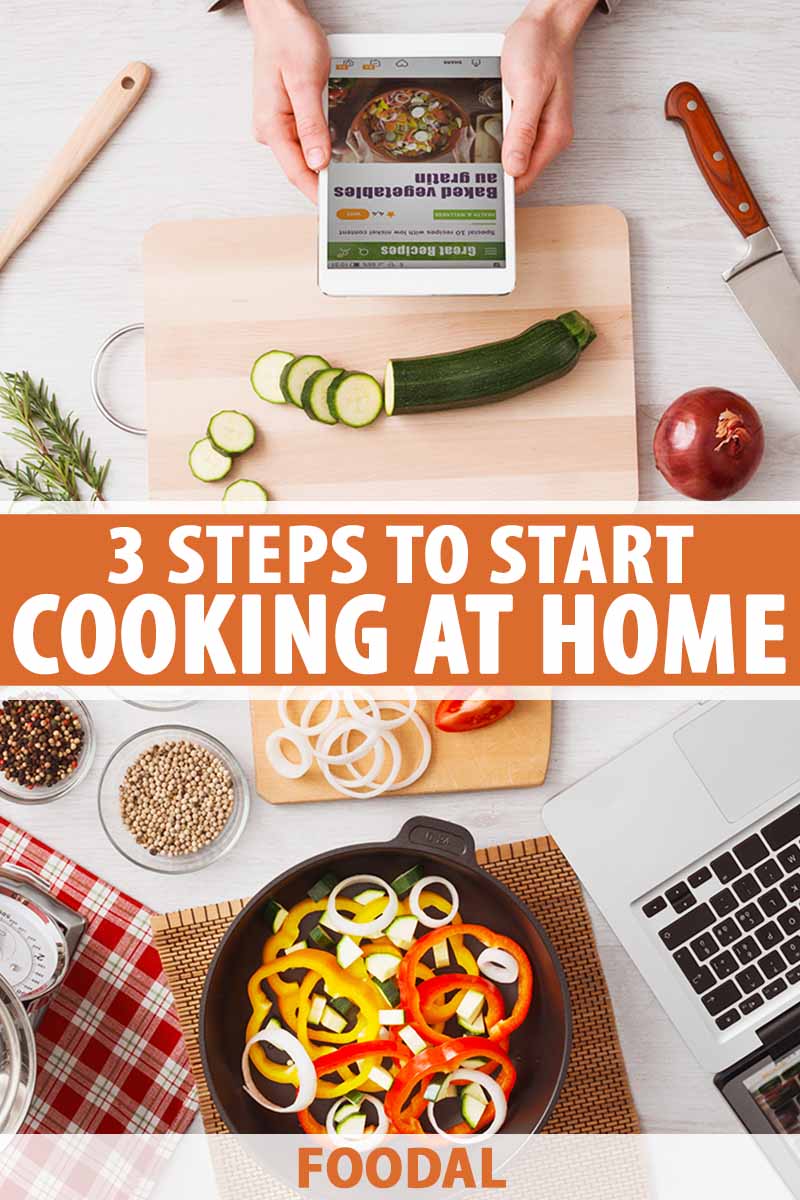
Maybe you’d like to eat healthier or save some money, but the idea seems a bit intimidating – a pretty natural response to making any changes in behavior.
Our brains are hardwired to keep us safe in old routines, even when they’re self-defeating. We’re masters of talking ourselves out of trying something new before we’ve even started!
Here’s the good news: we can overcome our resistance to cooking with three simple steps.
Today we’re going to bust the most common excuses for not trying in the first place, and learn some tips to begin and build upon new meal prep habits.
Start Cooking at Home with These 3 Simple Steps
1. Bust Excuses
To start, we need to bust those excuses we keep repeating to ourselves!
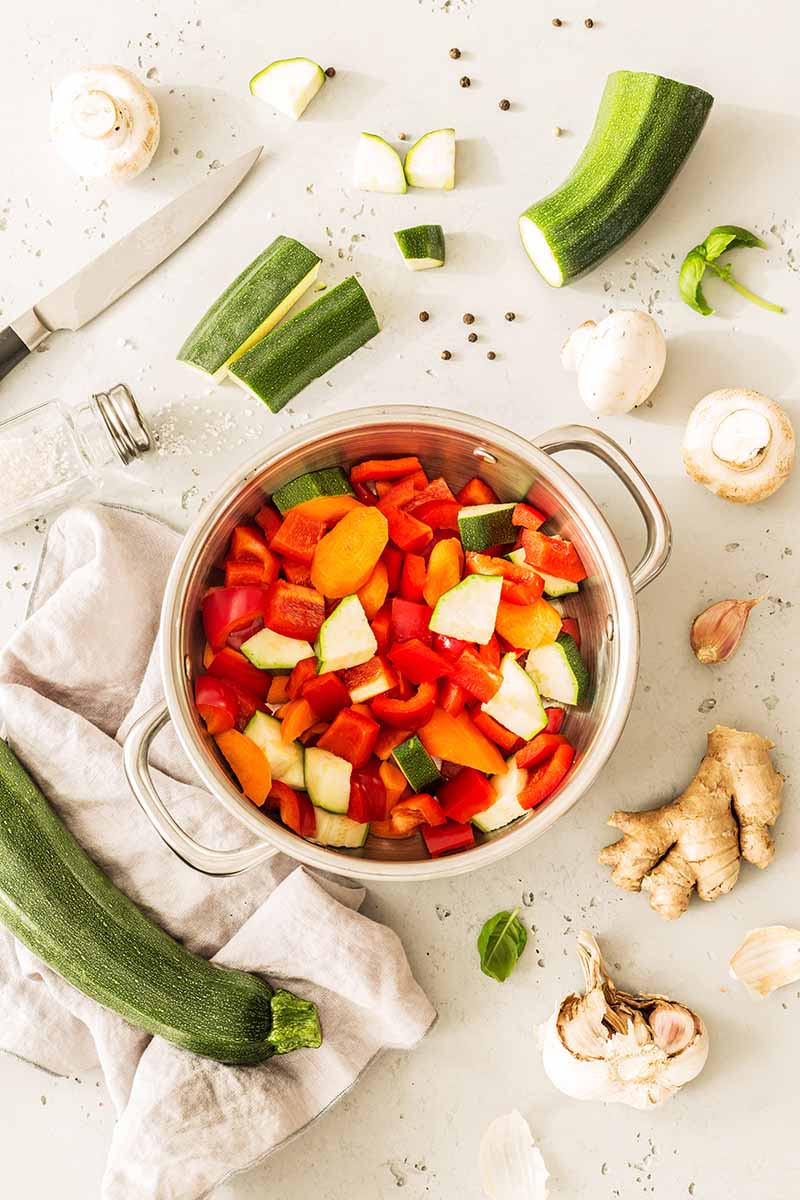
Motivation to start any new and healthy routine can be destroyed immediately when we let our long list of prepared excuses get in the way.
The following are the top three excuses we tend to use for not cooking at home, with useful suggestions to fight against them:
I Don’t Know How
Well, maybe you don’t know how to right now, but cooking is a learned skill that takes time to develop!
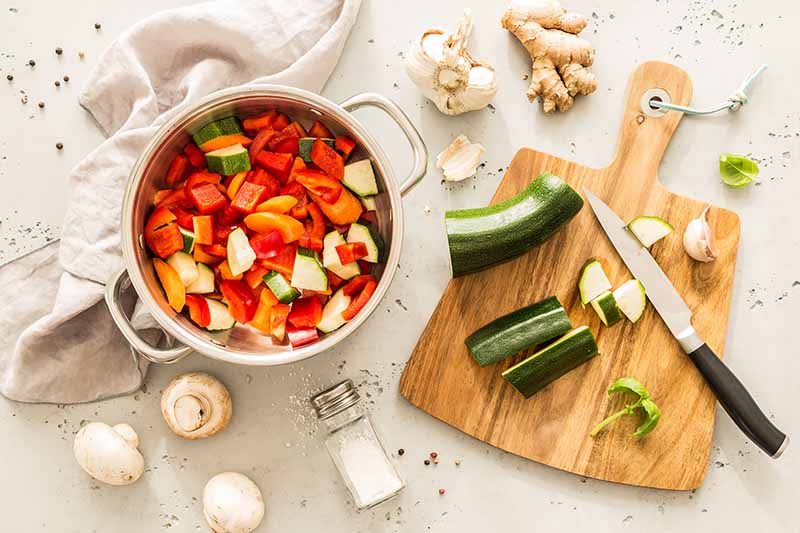
You can sign up for classes in your city. And bring an excited friend or an equally hesitant partner with you if you don’t want to go by yourself – you’ll have more fun together than you might expect.
You can also start to get into the habit of watching a recipe tutorial video every other day – in this day and age, there are multiple forms of media you can access to learn various methods and techniques you can apply in your own kitchen.
Better yet, start your home cooking journey by exploring Foodal’s website! We keep everything organized by popular recipe types in our full collection of recipes.
And you can learn all of the prepping, cooking, and baking basics with many of our tutorial articles.
I Don’t Want to Clean the Mess
Here’s the deal on cleaning after preparing a meal:
With the right strategy, you can keep your kitchen cleanup to a minimum.
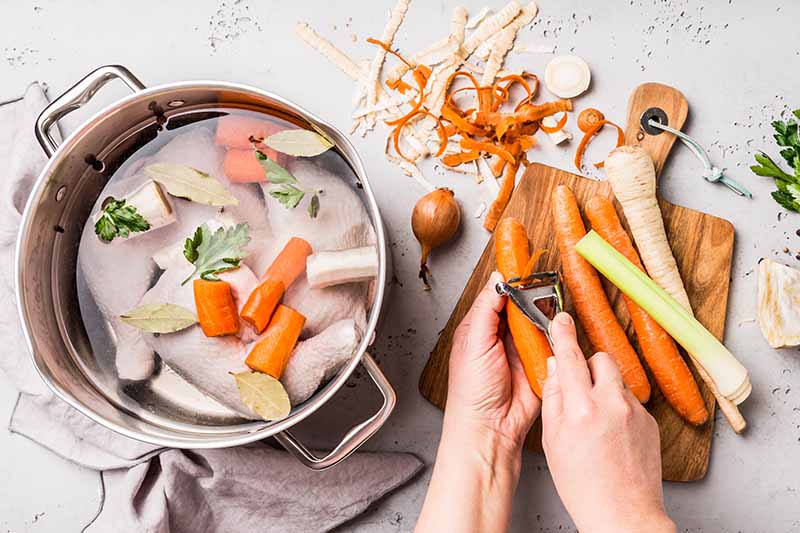
If you make one meal a week and double the recipe, you can get two meals from it, with only one cleanup session.
Make enough for a meal of leftovers, or pop a portion in the freezer. That’s two meals prepped without any extra work, a smart way to reduce the mess.
Also, it’s much easier to do your cleanup when you have some passive time available as the food is cooking. Need to wait at least an hour for your moussaka casserole to bake? Perfect! Use that time to clean.
It’s also smart to clean directly after the meal, before you move on to other activities and become distracted and less motivated.
Change your habit of seeing it as a chore by reviewing all the benefits you’re reaping as you clean, including getting in a little exercise!
I Don’t Have the Time
With all the demands on our time, finding a few extra hours for shopping and making a meal can seem impossible.
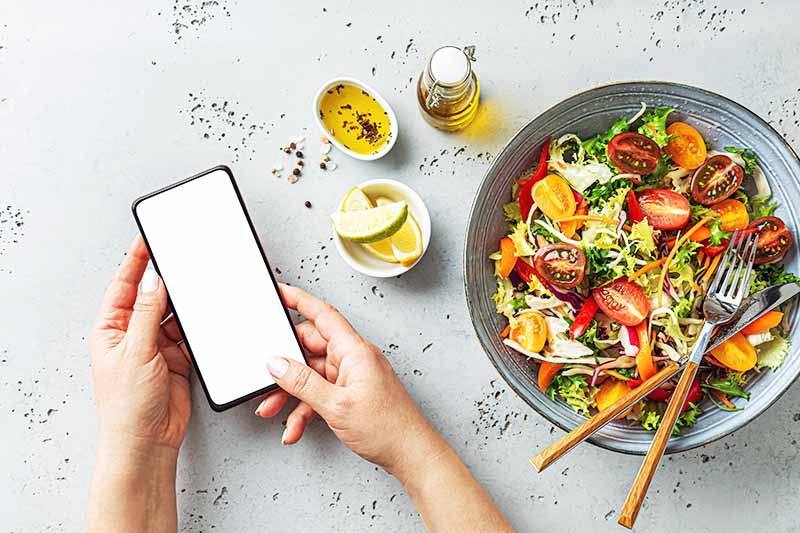
Have an honest look at how much time you spend watching TV, scrolling through social media, surfing the web, checking email, and other time-frittering activities.
I’m not saying you have to go cold turkey and eliminate these activities altogether – we all need them, to some degree! But if you’re selective and trim the time-wasting fat, you should be able to free up a few hours each week for grocery shopping and cooking.
If you need some extra motivation, write out all the reasons why you want to start cooking – to improve your health, lose some weight, save money, improve your self-esteem, be a better role model for your kids who might also want to start cooking with you… the more the better.
And keep copies in plain sight wherever you do most of your lounging!
For further advice on managing your time properly, you might find some new strategies in our guide to 30 time-saving kitchen hacks.
2. Analyze Your Eating Habits
Cooking at home doesn’t have to be healthier. But it certainly can be! And it often is by default, when we rely on fresh ingredients and unprocessed foods.
I reached out to psychologist, author, and professor Dr. Ramani Durvasula for some advice in her area of expertise – healthy behavior regulation. She generously shared these tips for our readers.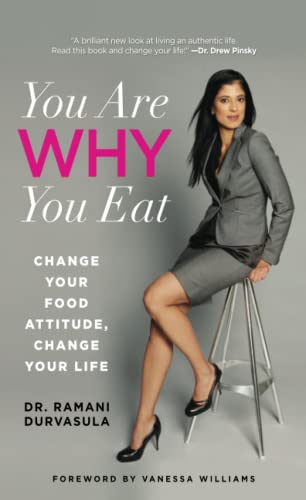
You Are WHY You Eat: Change Your Food Attitude, Change Your Life, available on Amazon
To learn more about Dr. Durvasula’s plan, pick up a copy of her book. “You Are Why You Eat: Change Your Food Attitude, Change Your Life” is available on Amazon.
Dr. Durvasula suggests asking yourself the following 5 “W” questions:
- Who do you eat your least healthy meals with?
- What are your food triggers?
- When do you eat? Do you have time triggers that set off certain impulses or unhealthy eating patterns, like in the evening when you watch TV or when you are reading?
- Where are your eating challenges the most pronounced?
- Why do you eat the way you do – what are the emotions or thoughts that set off your patterns?
When you are ready to make a healthy change to your eating and meal prep habits, make a list of your responses to these questions. Address them one by one, every few days.
Before you know it, the framework of unhealthy eating habits, like fast food reliance and excessive snacking, are exposed. Modifying them will become easier once you are able to clearly identify them.
3. Start Small
Regardless of whether or not you enjoy being in the kitchen, we still need to eat on a daily basis.
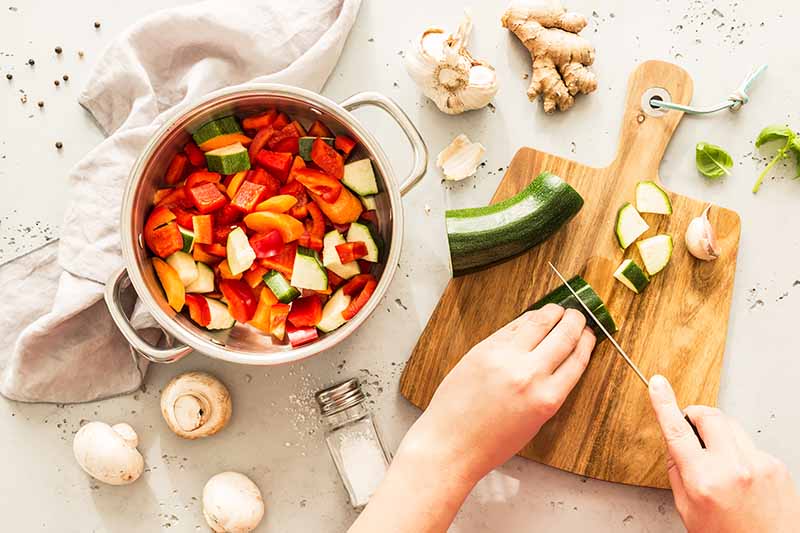
The choice then involves determining what and how we’re going to eat – and it’s best to not become overwhelmed by this basic necessity!
The main resistance arises when we try to do too much all at once. Break the change into smaller steps, and check in with yourself on each step.
For example, don’t try to go from zero made-from-scratch meals to one served every night of the week. Set a goal of making one meal per week for a month. Next month, go for two meals per week, and so on.
This way, you’ll consistently build your confidence, and almost effortlessly create new routines.
The ideal for homemade meals is quick, simple, and nutritious – you don’t have to prepare a banquet fit for serving heads of state every night of the week!
Keep it simple, and strategize what you’ll make for the picky eaters in your family. Look for recipes that have simple ingredients, short cooking times, and that don’t require a lot of equipment – one-pan meals are a great place to start.
Once you become comfortable with a roster of basic recipes, you can then start to branch out to learn more complicated techniques and tackle more extensive ingredient lists.
Start Cooking Today
There’s no big secret to home cooking, and you can start with just three simple steps:
Have a look at your usual excuses, ask yourself some empowering questions, and keep your recipes simple and practical.
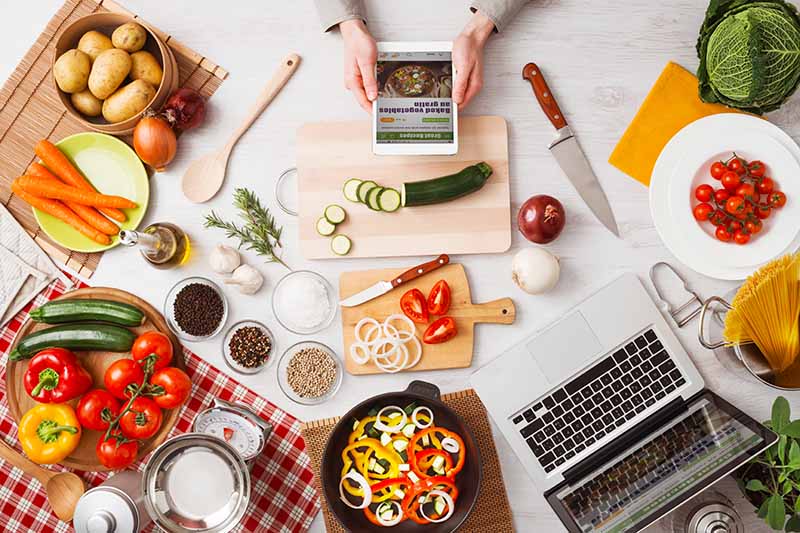
Take it one day at a time, even starting today. The benefits of cooking from scratch are worth it.
And once you get a few favorite homemade meals under your belt, you might even begin to have some fun in the kitchen!
What about you? Do you use any of the excuses above, or have a tip or two to help others? Tell us about your own kitchen struggles and successes in the comments below.
For more tips on how to get yourself and your kitchen set up for new, exciting, and delicious cooking endeavors, you’ll want to save these helpful articles:
- 11 Top Tips for Kitchen Safety
- 21 Common Cooking Mistakes and How to Avoid Them
- 13 Tips to Use a Garbage Disposal Right
© Ask the Experts, LLC. ALL RIGHTS RESERVED. See our TOS for more details. Product photo via Amazon. Uncredited photos via Shutterstock. Originally published on April 23, 2016. Last updated on March 8, 2023. With additional writing and editing by Nikki Cervone.
About Lorna Kring
Recently retired as a costume specialist in the TV and film industry, Lorna now enjoys blogging on contemporary lifestyle themes. A bit daft about the garden, she’s particularly obsessed with organic tomatoes and herbs, and delights in breaking bread with family and friends.

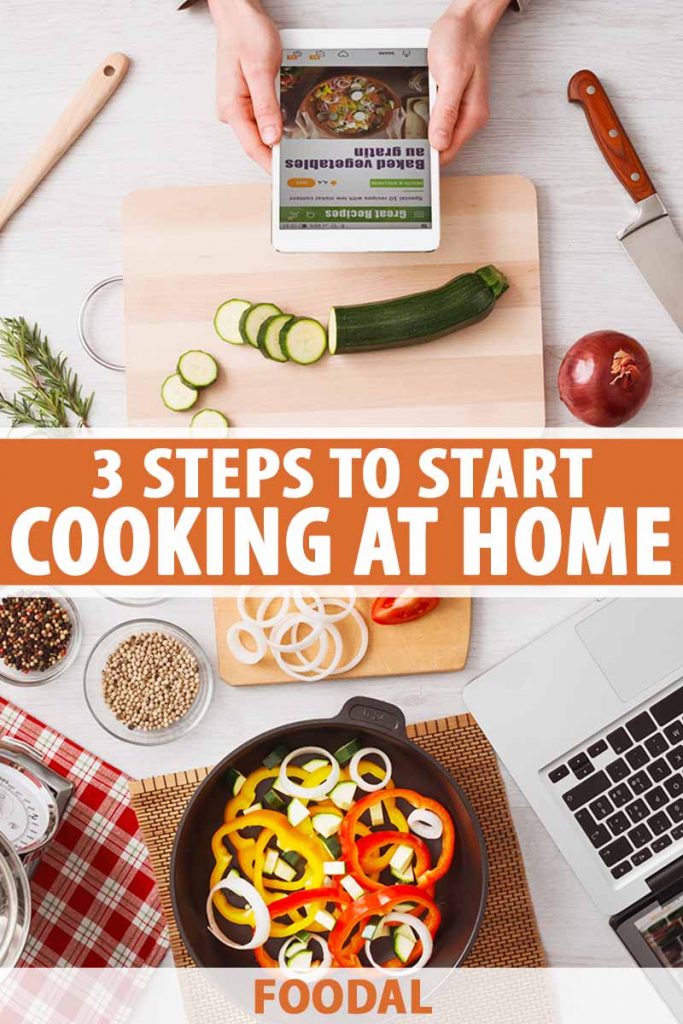
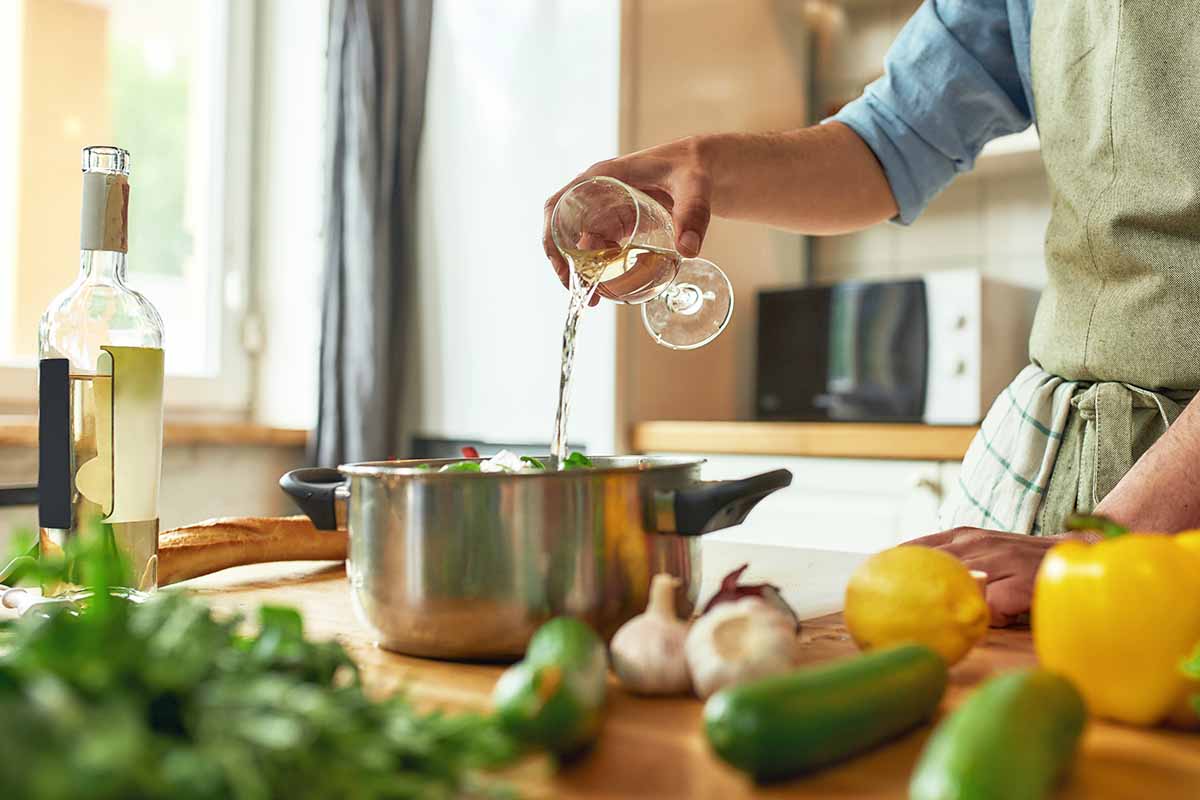

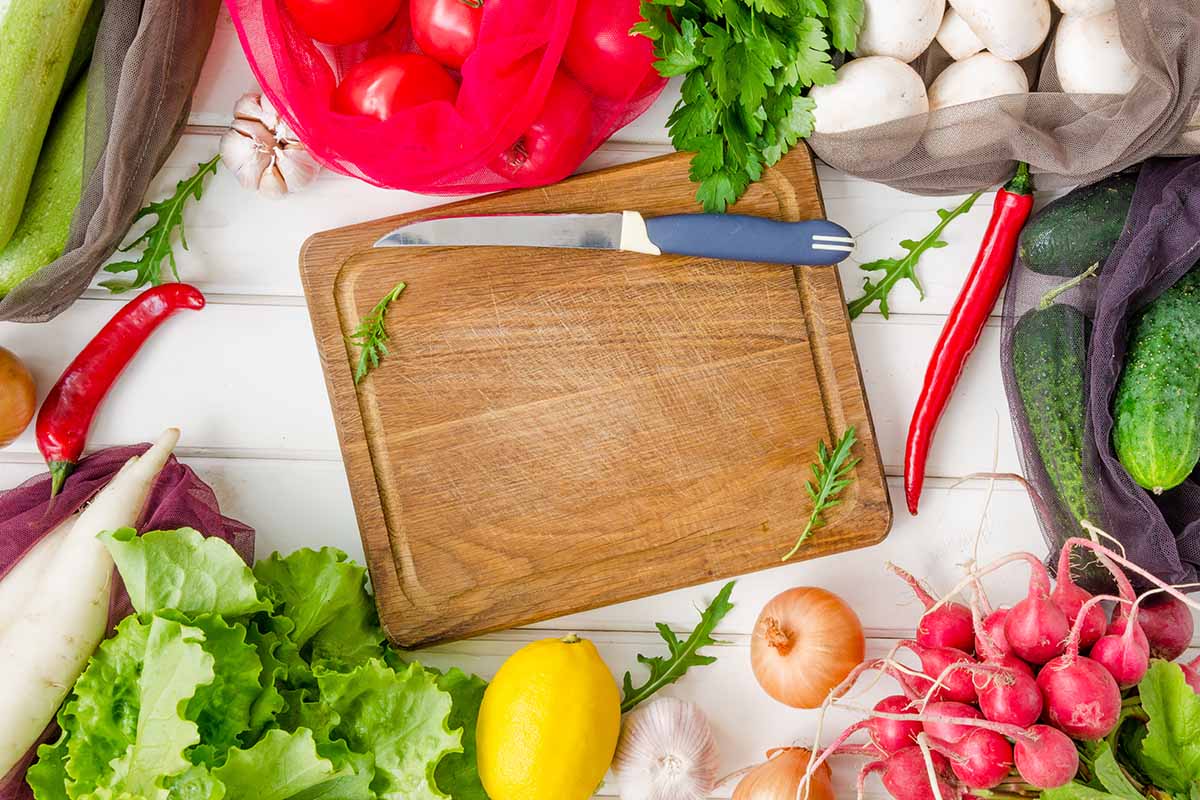
As someone who lives alone – and is a completely lazy bastard – the idea of cooking has always been a struggle for me. On one hand, if I cooked at home, it would be cheaper; I could learn more things and better my craft, and I would at least be sure that the preparation of the food was up to my standards. On the other hand, and I think most of you can agree to this, I HATE cleaning up after I am done. Doing the dishes, the large pots, greasy frying pans, and even the incredibly messy plates and bowls. It is really a problem for me, I have all these upsides and downsides, but I never really chose a side when it comes to doing it at home. What do you think?
There are pros and cons to every issue OITF, and it really comes down to what we focus on – which is usually the worst case scenario.
Would grilling up a piece of chicken or fish, steaming a few veggies, and making a salad for one really involve a huge mess, or is this a sly ego excuse to stay in your comfort zone?
Years ago I busted my resistance to cooking by training myself to see the chores of shopping and cleaning as just part of the process that would give me the results I wanted – greater health, better organization, more time and money etc. If you can build a strong enough case for making a change, the excuses will drop away… and it only takes a bit of effort for a couple of weeks, then you have a nice, healthy new habit!
I think one thing that helps me stay interested in home cooking is experimentation. I try new things all the time, play with seasonings and generally try to come up with tastes that are unique and different while still being good. Also, I leave myself the option of eating out on days when I just don’t feel like working in the kitchen. These things help to keep me from getting bored with the whole concept. Another thing I like to do is research healthy foods online and then incorporate them as much as possible into my dishes, because my husband doesn’t like raw veggies. In this way, I manage to get something reasonably healthy into him without a fuss.
You make a few excellent points Novelangel. Experimentation and curiosity are great for keeping your interest engaged, as is allowing a day off – very important for those low-energy days. Thanks for sharing your insights!
I’m so glad that you mentioned the time factor. A few months back, I participated in an online discussion about food and healthy eating and a lot of the participants talked about not having enough to prepare a home cooked meal, and that’s why they decide on take out food or boxed meals.
I made a comment about how cooking at home saves money, and I understand sometimes you might want take out and that’s okay, but there’s time. You just have to make it, and if someone can binge watch a TV series over the weekend, why can’t you make a huge pot of spaghetti sauce, or cook a big batch of beans to put away for the week. I mean seriously, you can still watch your program and make these things too! It’s about investing in yourself.
We’re so conditioned to thinking in terms of scarcity, it’s hard for a lot of people to realize they can have their cake, and eat it too.
Making healthy choices doesn’t mean a total sacrifice of fun or relaxing activities, it just requires a bit of discernment. And ironically, making those choices inevitably brings us more of what we’re actually looking for when we engage in using props like the TV or internet – a relief from stress and sense of well-being. And nothing’s as rewarding as investing in yourself! Thanks for your comments atlmom5!
That’s why my husband installed a TV and speakers with a cord to plug them into a cell phone in the kitchen. I find cooking (or doing the dishes) can be a great time to have TV on in the background, or to catch up on your favorite (foodie) podcasts!
Nice one Allison, multi-tasking at its finest!
I adore cooking and if I could give any advice to young people is to start cooking at home.
Just today, full of work and short on money I put some fresh garlic, basil, mint and olive oil on some pasta and had the best meal of the week. Simplicity is the key.
Great advice vegan93, we do like to make things complicated! Simplicity is lovely indeed… and so simple!
I love those simple meals that end up being the best ones. A little olive oil and some herbs is really all you need too, and I have always loved the “naked” pasta that you can make. When you plan ahead, you can really save, and you can control what goes in so you can make it taste just as you like, which is perfect. That pasta sounds delicious too.
Nice post. Getting rid of the excuses (even though they feel like good excuses sometimes) is good advice. The same goes for starting small. I think that applies in many areas of life. Start with small, do-able goals, and work your way up.
I need to send this to my daughter that just moved out recently, ha ha.
That sounds like a really good book too. Interesting.
Those “good” excuses are the worst Zyni, they sound so darned convincing! And you’re so right about starting small – baby steps can move mountains.
It is an interesting book, particularly if you like to know what makes us tick… Thanks for your comments.
From a purely financial perspective, it never made much sense to me to eat out more than at home. Even with rudimentary cooking skills somebody could eat at home cheaper than eating out or getting delivery. It isn’t hard to open a can, use a microwave, or poor a mix into a pot of boiling water. Interesting article.Great ideas for actual cooking!
Financial gain is a great motivator nytegeek! Good points, thanks for your thoughts.
I think the most important point that you make here is that you should start small. I know of a lot of people who say that they would like to learn how to cook, but they will then download complicated recipes that need loads of ingredients – when the only thing they’ve ever done before is warmed up food in a microwave! By taking small steps, and learning little things as you go, you should find that you are able to improve your cooking skills in a way that will leave you shocked with just how much you’re actually capable of!
So true Gemma. Trying something complicated and having it not turn out can be a crusher… starting small brings gradual results that are great for building confidence!
I was one of those people so I appreciate the effort you have put into this post, it will be very helpful for people who want to eat in a healthier way and make their own meals but they don’t know where to start. You are absolutely right in saying that one should start small, trying complicate recipes is a sure way to feel overwhelmed and give up.
As I said, I was very lazy when it came to cooking and I often had unhealthy and quick meals. I recognized myself in all the excuses you listed, those were my favorite way of refusing to face the problem. I started to change my habits slowly and now I’m very happy with my cooking skills and I’ve even lost a few pounds.
Dr Ramani’s book sounds like an interesting read, I will definitely buy it.
I think you’ve made some very good points about the psychology of getting started with a new routine. Basically, starting with small steps, and keeping things simple are the way to go. Home cooking does not have to be complicated to be tasty. Even if you’re just making a bacon sandwich, you can experiment by adding different herbs, mustard, mayonnaise, ketchup, pepper, cheese, and so on. It’s great fun to experiment with simple snacks like these, and then you get more confident to try other things. One other idea struck me – about time-saving: you can save time by cooking more slowly. Use a slow cooker that can cook your food while you’re out, and you come back to a nice hot meal that is ready to eat.
It really doesn’t take much to get started jon, as long as we make a start… experimentation and curiosity can really pique our interest to try new things.
And as you point out, it can be simple and easy with a slow cooker, or a big pot of chili or a hearty soup simmering in the background. Thanks for sharing your ideas!
Great testimonial for developing healthy, new habits Snarya! Thanks for sharing your success.
Hi Lorna,
These are some excellent tips. When I started in the kitchen at home, I went too big, too fast. I wanted to be a chef from the get-go, so the “start small” note is a really important one, I concur.
Also, excuses, excuses! The number of times I hear my friends use any of the three excuses you’ve mentioned… No wonder society is becoming so lazy, and obese. Nobody’s cooking at home anymore, and I think it’s just sad. I hope a few have been inspired to start cooking at home through your little guide here. I couldn’t have summed this up better myself.
Thanks for your comments Josh, I hope so too because the benefits really outweigh the alternatives!
The clean-up is the excuse I use the most, especially since I cook for just myself, it sometimes seems like a waste of time when it’s so easy to grab something prepared. But I have been using my freezer more and trying to do more cooking from scratch. One thing I really like to do is make a big chuck roast and then put it in individual servings. This way I can still take lots of nights off and eat a frozen dinner, but it’s one I made from scratch!
Grabbing something prepared is easy Lynk, but taking the time to prepare (and clean up) a meal for yourself is a great way to reinforce that you’re worth a bit of effort. And thanks for the roast tips, it’s a great idea!
I think this article is great for anyone wanting to start cooking for themselves. With the obesity epidemic and how many Americans take the “fast-food diet” route, anything that promotes easy and healthy cooking and eating should be given praise.
Some people think it is intimidating to cook, but I think that you do a good job of creating a simple and “do-able” way to eat healthy, and do it by yourself. When you mention the excuses that people use to avoid cooking and eating healthy, a lot of people in the modern fast-food way of life can probably relate.
I try to eat healthy and cook meals at home, especially because I have a young child. Although it is certainly overwhelming sometimes since I am a single mother. I think to not get overwhelmed and resort back to bad eating habits, people need to use simplicity when cooking. I like the idea of one pan meals that you mention, and you have some great examples and advice for which pans to purchase! After cooking for a while it sucks to have to clean up after, and this really minimizes clean up.
Cheers,
Jamie
You make some key points Jamie, and simplicity is certainly one of them – for meals and cleanup. I can certainly relate to your single parent syndrome, and hope you appreciate what a great model you are for your kid(s) in developing healthy eating patterns! Thanks for taking the time to comment.
Cooking is as simple as learning to tie your shoes. If you do it everyday, eventually it will become second nature. If you are just beginning to learn, don’t worry, there are plenty of recipe books, measuring instruments and of course the web. Step by step directions make learning to prepare food very simple, and if you love food like I do then cooking will also be fun! Clean-up can be stressful at the end of a long hard day, but trust me doing it after dinner, instead of the next day, will save your elbows and wrists. Plus leaving food setting around attracts nasty little flies, insects and cockroaches. So, with all being said get your recipes, head to the store, then get your cook on!
Solid advice through and through Amanda. And just like the cooking habit, taking care of cleaning can be handled in the same way. Thanks for your thoughts!
Guilty on all accounts! I’m ashamed to admit that my number one reason for not cooking is the I don’t know how to cook. But as the article mentioned, true one may start out not knowing anything in the kitchen, but when one puts her mind to doing it, it can actually be done. Since I quit my office job I have come to learn to cook one dish at a time. They’re not that great yet, but I’m pretty sure that it has improved than before. Oh, I still hate the cleaning – but yeah, much like not knowing how to cook, it too is doable!
LOL!, not know how to cook is nothing to feel ashamed about saravet, instead you should be feeling appreciative for the fact you’re learning a new skill – one that will bring greater health, eating enjoyment, money in your pocket, and a way to impress friends and family when you throw that first dinner party! And yep, the cleaning will come too! Appreciate your comments.
Okay, I actually enjoy cooking, but even getting in the kitchen and doing it can be intimidating for me! These were some really great tips. I definitely start small every time I get back into it. I can go months without cooking, then take it up again every so often and then find I do it more frequently as I get better and better at it. The one that stuck out the most to me was the one about time. I make the excuse often that I don’t have time but then sit down and watch 2 hours of tv a night. It’s all about what we want to make time for. Loved this! XO
Oh, we can be mighty self-deceptive with very little effort Kim! Just keep starting up with your cooking after you’ve stopped, and one day you’ll realize you’re not stopping anymore. Glad you enjoyed the post, and thanks for sharing.
I can almost always motivate myself to cook, which is a good start — I absolutely love cooking for my friends and family. My issue is that, even after years of practice, I can’t seem to make anything more complicated than a Buddha bowl or simple breakfast. I always see beautiful and intricate recipes and cake designs with really artistic plating, but I’m always too overwhelmed to try. Do you have any tips for a not-so-beginner chef looking to broaden their cooking horizons? Thanks!
Hi surlaw, sure… just apply the principles above. Start small, keep it simple, and be prepared.
Perhaps set a goal of trying one new dish, not an entire meal, every week or two – one that’s a bit challenging, but not overwhelming. Find a recipe that looks interesting, read it completely before you try it, make a list, then shop for the ingredients, and have everything laid out before you start.
Or, if you enjoy cooking for friends and family, how about planning a brunch? But don’t turn it into a three-ring circus. Rather than trying a fancy cake, try something easier like scones or baking powder biscuits and dress them up with fresh fruit. Learn how to toss and catch a single ball before juggling five flaming torches!
Plus, don’t sweat it over mistakes. If a dish doesn’t turn out perfectly, figure out what when wrong and progress from there – and check out this earlier post to see if you make any of the common cooking errors we all indulge in. https://foodal.com/knowledge/how-to/common-cooking-mistakes/
And, of course, have fun! Thanks for your question, hope this helps.
I literally have hundreds of recipes and cooking ideas, but my problem is I simply don’t have the time. I work full time and have two young children which makes it a bit difficult. Whenever I get the chance I start early and cook up a storm, but it doesn’t happen that often. This article gives small tips on how to begin, how to organise and plan for cooking. Thank you Lorna for posting this article.
You’ve got your hands full Finman! Glad you found a few tidbits to be helpful with your busy life…
Lorna, I have to first of all applaud you for this brilliant pit of prose: “trim the time-wasting fat” – haha! You really made me smile there, so clever!
All in all I agree that there are many excuses for not getting into the kitchen, but once you do the very great majority of people discover not only something they enjoy and helps them relax, but also a way to feel more empowered. It’s a great feeling to know that you are in control of the ingredients that your family ends up consuming. My top tip for starting out is to discover just one or two simple meals that you make well, and slowly build up your repertoire from there. I started off with an absolute phobia of baking for example, and now feel confident enough to try out my own recipes! Baby steps is definitely key though!
Glad you found the humor! You make some good points cafwen, and your top tip is spot on – a bit of success is great for building confidence. Thanks for your thoughts.
Well the I do not have the time one is certainly one that I throw out there a lot, and probably too much now that you mention it. I think that it all comes down to knowing your favorites and making it easier to make the quicker, though. If I have the things on hand, it is much easier for me to make it a point to eat at home, because I feel like I have to just not to waste the food. I think those little tricks can go a long way. Thanks for sharing.
Making it easy on yourself with ingredients on hand is certainly a key point rz – and feeling guilty about not wasting food is a great motivator!
Homemade meals are fresh and yummy.